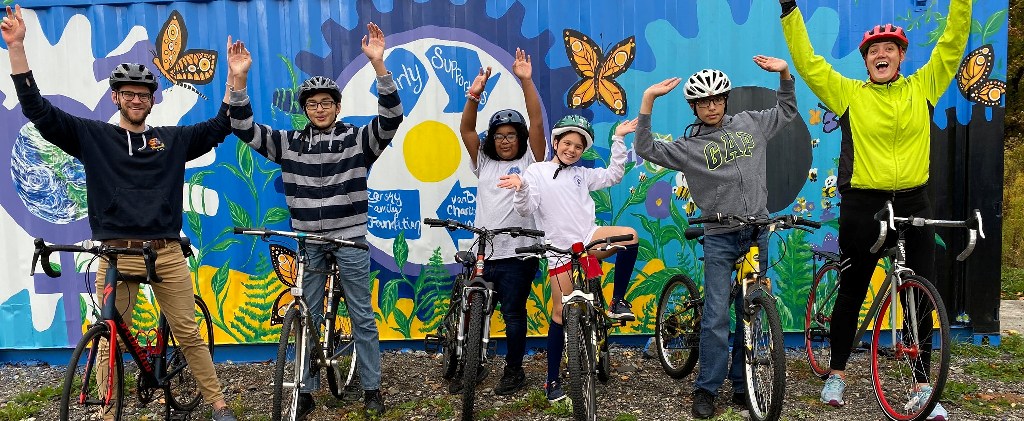When Bike Newport founder and executive director Bari Freeman moved to Newport in 2009, she saw a great potential for promoting bicycles for transportation. “I picked up a beater bike to avoid the congested tourist traffic and started pedaling,” she says. “And then I thought, wow, more people must want to ride, too. Newport would really benefit from being a bike-friendly city.”
A lot of local folks agreed. Bike Newport soon took shape and launched as a grassroots, all-volunteer effort in 2011. Bari reached out to all the resources she could identify, including the circle of business mentors associated with Social Venture Partners, which later became Social Enterprise Greenhouse. In 2012, Bike Newport received its first funding and became a prominent member of SEG’s coworking space at the Seamen’s Church Institute. Over the next several years, as Bike Newport grew its programming, volunteer base, and funding streams, SEG served as the venture’s fiscal sponsor. The two organizations developed a deep, robust relationship.
“SEG has such a wealth of people and ideas that it’s the place to go to explore different answers. So whatever my question is, I think of SEG as a resource.”
“We worked very closely with SEG’s CFO Antonieta Falconi to set up our financial management systems, which was incredibly helpful to us as a startup,” says Bari. “We were in good hands while we were figuring out what we needed to do. By the time Bike Newport became an independent 501c3 organization in 2017, we were very well prepared.”
Now established as a vital part of the Newport community, Bike Newport continues to deliver on its mission to get more people onto bikes and to ensure that biking is a safe and reliable choice for transportation and recreation. “We look at our mission as having three parts that support one another and keep the wheels turning,” says Bari. “We provide education, advocacy, and community building. We design our programs for people of all ages and abilities, and we work to improve our local bicycling infrastructure so it is equitable and accessible. We also cooperate and collaborate with other programs throughout Rhode Island on efforts such as the first statewide bike mobility plan.”
The SEG Network Effect
Before she ever arrived in Newport, Bari had a long history of managing and advising high-profile, national nonprofits. “In my earlier work, I brought people together to identify common threads and develop messages and principles that were easy for the public to understand,” she says. “It was about making an issue or an organization or a leader accessible in a way that people could join and get behind. Bike Newport happened in the same way, and we certainly gained from the collection of experts around SEG who were thinking about growing and encouraging social enterprises.”
For Bari, the opportunity to organically share expertise and be mentored by experts was a real plus. “My MO in life is that there are a lot of different answers to any question, and you need to explore them and figure out what’s right for you,” she says. “SEG has such a wealth of people and ideas that it’s the place to go to explore different answers. So whatever my question is, I think of SEG as a resource. Just being in an SEG space, those options, people, answers, perspectives, lenses, are going to be there.”
Bike Newport has also taken advantage of SEG as a resource for finding staff and interns, and recently convened an expert consulting team, called an SEG Huddle, to tackle a specific strategic issue. “SEG really is a greenhouse,” Bari says. “We have experienced seven years of collaboration in the most organic ways imaginable.”
Bike Newport is booming. Budget, programming, and impact have all grown. They offer a wealth of afterschool programs, including one specifically for children with autism and other learning challenges. There’s an Open Garage program, where people can learn how to fix their own bikes, and a Bike Library, where kids can check out a bike for free. Last year, thanks to their support, up to 1,800 people happily biked to the Newport Folk Festival each day. Bike Newport is also building a new facility on the north side of the city’s Miantonomi Park. The “Big Blue Bike Barn” is modeled on the Red Shed Bike Shop located in Riverside Park in Providence.
“I like people to think about the social justice side of what we do. We work to make sure that everybody can get wherever they need and want to go – comfortably and safely. And they should be able to choose a bicycle to do it.”
For Bari, Bike Newport’s community bike program is a strong measure of the organization’s success. “We collect bikes and restore them and get them back out into the community,” she says. “For many years it was once a week, a few volunteers in an off-site location. Now we’re three or four days a week with 25 people at a time. Everything we do is in English and Spanish, and we have a native Spanish speaking educator, so we’re reaching far more of the community in Newport than we ever have before. We give out 300 bikes a year. It’s a “Do It Together” shop. The people who are in the Garage at any time are every walk of life, every gender, every age, and every level of knowledge about bikes. People with very different life experiences are all working together and helping each other. Bikes are a great equalizer.”
Bari and her team work hard to make sure bike culture is open to everyone. “I like people to think about the social justice side of what we do,” she says. “We work to make sure that everybody can get wherever they need and want to go – comfortably and safely. And they should be able to choose a bicycle to do it. Whether for transportation or recreation, bicycles bring a lot of solutions,” she continues. “Environmental and health, preservation and connectivity. Expecting people to use cars or transit that might not be available creates difficulties. It makes transportation undependable. Biking provides dependability and also has this incredible happiness factor. People get off a bike and they’re smiling.”
A final surprising fact? Bari is a relative latecomer to biking. That beater bike she bought when she moved to Newport started everything, and now she considers long-distance biking her favorite activity. She’s taken extended bike trips with a friend through the Netherlands, Belgium, Quebec Province, Nova Scotia, and Prince Edward Island, and a solo trip through France. “What I love about biking is the slowness of it, the ability to just enjoy where I am,” she says. “I knew I had arrived in Provence because I could smell the rosemary on the breeze. That doesn’t happen in a car.”


